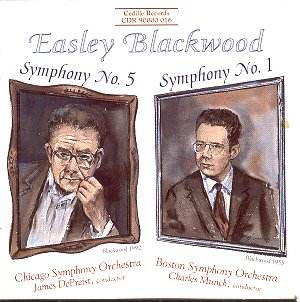Easley BLACKWOOD (born 1933)
Symphony No.5 op.34 (1990)
Symphony No. l Op.3 (1955) (a)
 Chicago Symphony Orchestra;
James DePreist
Chicago Symphony Orchestra;
James DePreist
Boston Symphony Orchestra; Charles Munch (a)
Recorded: Orchestral Hall, Chicago, May and June 1992; Symphony Hall, Boston,
November 1958a
 CEDILLE RECORDS CDR
90000 016
[57:46]
CEDILLE RECORDS CDR
90000 016
[57:46]
Crotchet
Cedille
Records

The American composer Easley Blackwood studied with Nadia Boulanger in Paris
where he completed his Symphony No. 1 Op. 3 in 1955. This is a quite
ambitious and substantial score written, I suspect, under the spell of Honegger
(and none the worse for that!). It is laid-out in four sizeable movements
adopting, according to the composer's notes, the Franckian cyclic pattern
though the music is unmistakably modern (i.e. by 1955 standards). The first
movement opens with an impressive slow introduction stating the main material
on which most of the piece will be based. The music then moves into a vigorous
Allegro redolent of Honegger and Hindemith, but quite impressive in its own
rugged way. The slow movement, while dynamically contrasted is a tense piece
of music that does not dispel the tension accumulated in the course of the
first movement. The following Allegretto grotesco (shades of Shostakovich
here) has its share of irony and, at times, sounds as a distorted, out-of-tune
Waltz. The last movement, a weighty slow-moving Andante sostenuto, is more
appeased and eventually dispels the tension generated during the course of
the preceding movements, but it nevertheless ends inconclusively. Easley
Blackwood's First Symphony is an impressive achievement whose sheer vitality
and exuberance sometimes makes up for sometimes comparatively unmemorable
music. A youthful, ambitious work and no mean achievement indeed. Charles
Munch, who consistently championed contemporary music, conducts a vital
performance of the work which he obviously regarded highly. The 1958 recording
made in Boston, probably by RCA is very fine indeed and its commercial re-release
is most welcome.
Blackwood admits to being a chameleon-like composer undaunted by radical
stylistic moves and agrees that his Fifth Symphony, written in 1990,
is more conservative than the First of 1955. The Symphony No. 5 Op. 34, though
unquestionably from the same pen, is more traditional both in its layout
and in its actual music. Its three movements adhere to the usual fast-slow-fast
pattern. The vigorous Allegro inquieto is quite agitated but less
emotionally charged than its counterpart in the First Symphony. The slow
movement, probably the finest of the whole work, is a dark-hued meditation
building towards a massive climax (again shades of Shostakovich) before reverting
to the calm mood of its opening. The final Allegro vivo, serving both
as a rondo and as a scherzo, rushes the symphony towards its affirmative
conclusion. Blackwood's Fifth Symphony, though still a fine work, is lighter
in content than the First and musically a bit more eclectic. It does not
have the youthful energy and the white-heat tension of the earlier work,
and - to a certain extent - it seems to lack the uncompromising confidence
displayed in the First Symphony. Nevertheless it is a quite satisfying piece
of music that aims, pace the composer, at pleasing both the orchestra
and the audience. A very fine performance by James DePreist and the Chicago
Symphony Orchestra.
This release adds to our appreciation of the 20th Century American symphony.
Blackwood's music may be less polished and less personal than, say, Mennin's
but his First Symphony is certainly one of the finest American symphonies
I have heard so far. I wonder what the other three are like. Well worth having.
Hubert Culot

